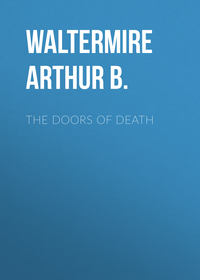Kitobni fayl sifatida yuklab bo'lmaydi, lekin bizning ilovamizda yoki veb-saytda onlayn o'qilishi mumkin.
Kitobni o'qish: «The Doors of Death»
A strange and curious story is this, about a banker whose only fear was that he might be buried alive, like his grandfather before him
A heavy stillness hung about the great halls and richly furnished rooms of Judson McMasters' residence, and even seemed to extend out over the velvet lawns, the shrub-lined walks and sun-blotched reaches under the lacy elms and somber maples.
Biggs glided about the sick-chamber like a specter, apparently striving to keep busy, while he cast countless furtive, uneasy glances at the heavy figure under the white sheets. An odor of drugs and fever tainted the air, and a small walnut table near the flushed sleeper was laden with the familiar prescription bottle, tumbler and box of powders. On the wall behind the table, near the head of the bed, hung a small oil-painting of Napoleon.
The sleeper stirred restlessly, raised himself painfully and slowly, and attempted to seek fleeting comfort in a new position. At the first movement Biggs was a shadow at the bedside, deftly manipulating the coverings and gently aiding the sick man with a tenderness born of long service and deep affection. As the massive gray head sank into the fluffed pillow the tired eyes opened, lighted by a faint glint of thankfulness. Then they closed again and the once powerful body relaxed.
With a pitiful, wistful expression on his aged face, the faithful Biggs stood helplessly peering at the sick man until hot tears began to course down his furrowed cheeks, and he turned hastily away.
"Biggs!"
The voice, still strong and commanding, cut the semi-gloom like a knife.
Biggs, who was about to tuck the heavy curtains still more securely over the windows, whirled as though he had touched a live wire, and in a flash was across the great room and beside the bed.
"Did you call, sir?" His voice quavered.
"No"—a faint twinkle lighted the sick man's eyes—"I just spoke."
"Ah, now sir," cried the overjoyed Biggs, "you are better, sir."
"Biggs, I want some air and sunshine."
"But the doctor, sir–"
"Drat the doctor! If I'm going to pass out I want to see where I'm going."
"Oh, but sir," expostulated the old servant, as he parted the curtains and partially opened a casement window, "I wish you wouldn't say that, sir."
"I believe in facing a situation squarely, Biggs. My father and grandfather died from this family malady, and I guess I'm headed over the same route."
"Please, sir," entreated Biggs.
"Biggs, I want to ask you a question."
"Yes, sir?"
"Are you a Christian?"
"I try to be, sir."
"Do you believe in death?"
Biggs was thoroughly startled and confused.
"Why—a—we all have to die, sometime, sir," he answered haltingly, not knowing what else to say.
"But do we actually die?" insisted the sufferer.
"Well, I hope—not yet," ventured the old servant. "The doctor said–"
"Forget the doctor," interposed McMasters. "Biggs, you have been in our service since I was a lad, haven't you?"
Tears welled into the servant's eyes, and his voice faltered.
"Fifty-six years, come next November," he answered.
"Well, let me tell you something, that even in those fifty-six years you never learned, Biggs. My grandfather was buried alive!"
"Oh, sir! Impossible!" cried Biggs, in horror.
"Absolutely," asserted the banker.
"Why—are you—how do you know, sir?" in a hoarse whisper.
"My father built a family mausoleum in the far corner of this estate, didn't he?"
"Yes, sir—he hated burial in the earth, sir, after reading a poem of Edgar Allan Poe's, sir!"
"What poem was that, Biggs?"
"I don't recall the name of it, but I remember the line," faltered Biggs.
"What was it?"
"Oh, sir," cried the old man, "let's talk about something cheerful."
"Not until we're through with this discussion, Hiram."
The sound of his given name restored Biggs somewhat, for the banker resorted to it only on occasions when he shared his deepest confidences with his old houseman.
"Well, the line goes, 'Soft may the worms about him creep,' sir."
